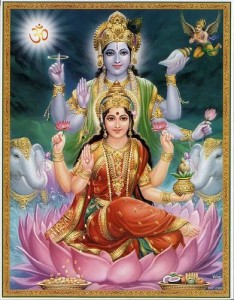
Diwali is a five day festival in India. It begins with Dhanteras, followed by Kali Chaudas and Naraka Chaturdashi, and then the night of Diwali itself. Diwali or Deepavali is the Indian festival of lights. “Deepa” means light and “avali” means a continuous line. Diwali occurs just before the Indian New Year. Diwali 2014 will be celebrated on different days in various parts of the world, due to the phase of the Moon utilized to calculate holidays in Vedic astrology or Jyotish, as well as the solar eclipse on October 23. According to mypanchang.com, Diwali 2014 falls on October 22 in North America. However, India and the rest of the world will celebrate Diwali 2014 on October 23.
As explained on mypanchang.com, the new Moon has to prevail for over 2 hours after sunset to celebrate Diwali and perform Lakshmi puja. This will only occur in North America on October 22. On the 23rd, we have the solar eclipse and then we will see the first phase of the waxing Moon (pratipat) after sunset.
Indian new year is on the 24th everywhere except for Australia, New Zealand, and Filji. They will celebrate the new year on October 25. More on Indian new year will be written in an upcoming blog.
Diwali celebrates Lord Rama’s return back home after a 14 year period of exile. The residents of Ayodhya (I-yo-the-yah) celebrated his homecoming by lighting rows and rows of lights, or diyas and waving sparklers. Rama symbolizes the path of righteousness or dharma. His return is a metaphor for the victory of good over evil.
Indians celebrate Diwali by wearing colorful, new clothes and honoring the goddess Lakshmi (luck-shmee), the goddess of prosperity, fortune, and beauty. Their homes are brightly lit with clay diyas. Some also regard Diwali as the day on which Lakshmi and Vishnu were married. Homes are cleaned from top to bottom so that Lakshmi can grace the home with her presence. Pujas (ritual worship) to Lakshmi is traditionally performed on Diwali. People feast on a sumptuous variety of sweets made from ingredients such as jaggery, sugar, ghee (clarified butter), cardamom, cinnamon, and nuts.

Shri Vivek Shatri of the Shri Krishna Yajurveda Pathashala had this to say about Diwali: The darkness of the demon is gone and there is light. Rama and Krishna are forms of Vishnu. For Lakshmi puja, we worship Lakshmi and Kubera. Kubera is the treasurer of the Vedic gods and goddesses. One of Vishnu’s names is Kubera. Kubera is the step brother of Ravana. His kingdom was Lanka. When Ravana became strong, he defeated Kubera. Afterwards, Kubera went North. In Vaastu Shatra, the Northern direction is associated with Kubera and prosperity. Kubera is the deity who owns gold, diamond, precious things. People should clean their homes for Diwali. For Lakshmi puja, they can worship money, jewelry, bank books, and credit cards. They can chant the Maha Lakshmi Stotram 15 times. There is also a small stotram for Vishnu called the Govinda Ashtakam.
Mypanchang.com has graciously listed the muhurta (auspicious times) for Diwali and Lakshmi Puja in North America for the 22nd well as for India, Europe and the rest of the world on the 23rd.
There is a partial solar eclipse (surya grahan) happening on the 23rd in North America. This falls on Diwali in India. This makes the Diwali 2014 festival less auspicious than usual. The Shri Krishna Yajur Veda Pathashala will be performing Lakshmi puja for the new year. They will offer flowers and saffron and chant the Vishnu Sahasranam and Lalita Sahasranam. Traditionally, there is no havan (fire ceremony) for Lakshmi puja. To participate in the puja, please send an email to sohamvg@gmail.com. According to Shri Vivek Shastriji, due to the surya grahan coinciding with Diwali 2014 celebrations, it is even more important to be mindful. When you chant hymns or mantras during the eclipse, they are even more powerful. They are more beneficial for prosperity and health.
Diwali marks the celebration of light over darkness, as Rama was victorious in defeating the demon Ravana prior to his return to Ayodhya. It is also a time when we can honor our own inner light and let it shine forth into the world.
Happy Diwali 2014!